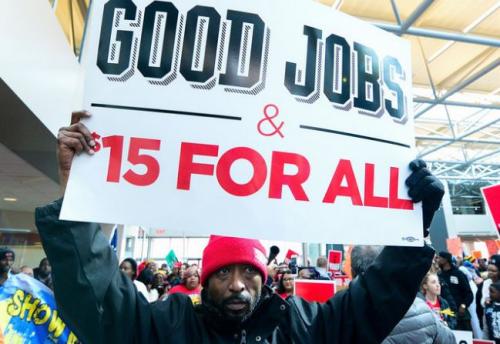 When governments interfere with the free market by raising the minimum wage, prices for everything naturally reset to accommodate that wage; it doesn’t matter if the hourly minimum wage is $15, $20, $25 — or even $1. Think about it; if raising the minimum wage was a panacea for making hard-working people in the bottom income bracket wealthier than they already are, then why wouldn’t we increase it to $1000 per hour and make everybody fabulously “rich”?
When governments interfere with the free market by raising the minimum wage, prices for everything naturally reset to accommodate that wage; it doesn’t matter if the hourly minimum wage is $15, $20, $25 — or even $1. Think about it; if raising the minimum wage was a panacea for making hard-working people in the bottom income bracket wealthier than they already are, then why wouldn’t we increase it to $1000 per hour and make everybody fabulously “rich”?
The bottom line: If you work a minimum wage job, you will always live a minimum wage lifestyle — no matter how much you’re paid for an hour of work.
Photo Credit: Jeff Curry – Getty Images

No. Inflation is a lot more complicated than a simple linear response to minimum wages, and hasn’t really been a significant problem in developed countries for generations now — about the same length of time that the overall gains from economic growth have been flowing almost entirely to capital rather than labor. No one’s talking about strawman extremes like raising the minimum wage to “$1000 per hour”. Conservative critiques of minimum wage policies more often focus on supposed job losses, but since you don’t address those here, I’ll just note that empirical studies don’t bear that out either.
So, in other words, you’re arguing that it is indeed possible to lift society’s living standards by raising the minimum wage. Interesting — but wrong. If it were that easy, it would have been done by now — without the need for any government mandates. Countless studies have shown that wage inflation is the biggest driver of price inflation.
And yes, there is plenty of evidence that raising minimum wages results in job losses, despite your assertion to the contrary. The most recent example can be seen in Seattle … or anecdotally, one only has to observe the food industry’s decision to counter the drive for higher minimum wages via the introduction of self-serve kiosks.
Free market also has a nasty habit of privatizing profits and socializing losses.
Should the free market interfere with the citizenry and pay employees low wages and rely on our compassion (i.e. government / society / tax payers) to pay for food stamps, low income housing, heating, childcare … ?
But hey, Im not dogmatic and Im pretty open minded. Im okay with no-minimum-wage-laws but I’ll need all welfare that enables loss socialization killed first.
And an aside: The other sad truth is that self serve kiosks and robots will do the job (selling stuff, improving productivity, no breaks, holidays, sick leaves) better compared to low skill humans. So, minimum wage or no, self serve kiosks and robots are on their way. Humans must stay ahead. Gone are the days where you skill up, educate up, take a job, start a family and then, stop skilling / educating up for the next 50yrs. ….
And the other sad truth is that once you find yourself limited in time and money, it can be pretty hard to get out of the rut. Neither can you afford night college nor can you afford babysitters while you go to night college. It will be a hard exponent to get out of. Will need iron will, extreme budgeting, etc, etc, etc …. the lack of which probably has some correlation to why you are in the rut in the first place …. an unfortunate but sad reality ….
Privatizing profits and socializing losses is not a trait of the free market, Kyron — that is only possible via government intervention.
IMO, minimum wage laws are of no import in the lives of competent people.
They will eventually surpass the minimum, in wages and everything else.
I agree. It makes more sense to focus of honing one’s skills rather than lobbying the government to raise the minimum wage.
LP,
Exactly! I don’t know why this is so hard for people to understand. A minimum wage job is a minimum wage job no matter if you are paid $1/hr, $500/hr, or in vodka/hr. Everything else will stabilize around this new number.
Derek, some folks purposely choose not to understand because to do so would invalidate their ideology.
A minimum wage is simply out of mind for successful people, in all circumstances. To the extent we think about government and our incomes at all, we have seen the effect on the lives of those who have relied on the nanny state and what it does to the morale of our country. We want no part of it.
No one who is competent in any field works for minimum wage in my experience. Once you are competent and have experience it is up to you to weigh wages/benefits from each job offered and look closely at the hidden costs.
I once changed from a $12 hourly job that required 4 to 5 hours of sitting in traffic commuting to an $11 hour with a 30 minute commute. I looked at the hidden cost of that loss of 25 to 35 hours every week and made a decision that worked better for me and meshed with more than just my paycheck goals.
Debbie, your story is another good example of opportunity cost. Thanks for sharing that!